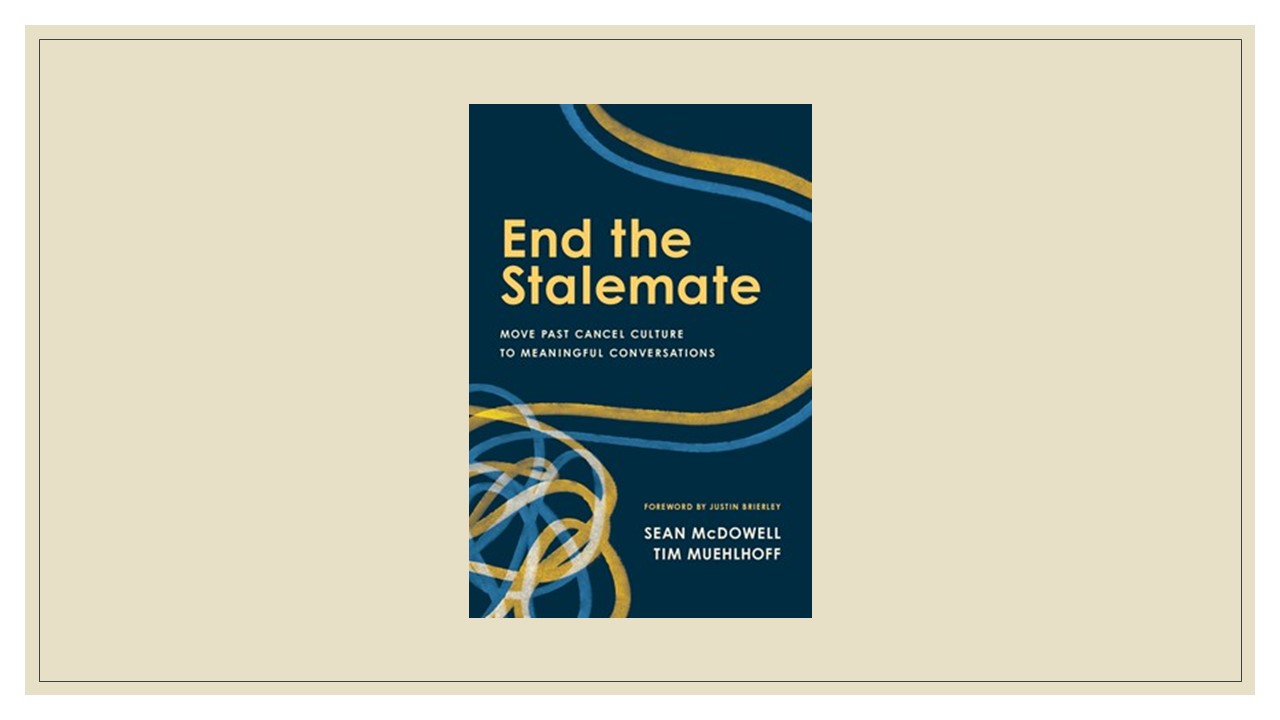End the Stalemate, Sean McDowell and Tim Muehlhoff. Tyndale Elevate (ISBN: 9781496481153), 2024.
Summary: Addresses how we move past impasses around disagreements to have meaningful conversations.
Our highly polarized cultural atmosphere has led to the breakdown of civil discourse, a rancorous political atmosphere, and sadly, friends and family who no longer talk to each other. It has led to a situation where many do not feel free to share their opinions in their families, workplaces, or in public discussions. It just doesn’t feel safe.
The authors of this book are both engaged in dialogue with those with whom they would disagree, including at times, each other! Sean McDowell, a professor of apologetics, frequently engages in discussions and debates with those who do not agree with his reasons for believing. Tim Muehlhoff is a professor of communication who directs the Winsome Communication Project. Both host podcasts focused on conversations with those who differ on important questions. This book, to which each have contributed chapters focuses on how we may both prepare to engage with those with whom we differ and how we may have those conversations in ways leading at very least to civil disagreement and perhaps growing mutual understanding.
They begin by contrasting a transmission versus ritual view of communication. The transmission view has problems with myside bias that doesn’t reckon with counterarguments and often leaves everyone more entrenched. The ritual view looks for points of commonality where there is an emotional connection, sympathy, with the views of another. This requires understanding the way both we and those we engage with see the world. The writers describe this as bricolage, because often worldview is pieced together from disparate pieces into a whole that makes sense to the person, whether or not consistent. Some of the pieces include our communities, families, hinge moments in our lives, narrative injuries that may have altered our lives and beliefs, and influencers. The goal of understanding as much of this as possible is perspective-taking, where we try to see the world as the person we are engaging does.
All this lays the groundwork for constructive conversations. How then do we have these conversations? One basic principle Sean McDowell uses is: “Show as much grace and charity as you can without violating your conscience.” He believes one has to approach issues with clarity (what it actually is), charity, and critically. But many conversations approached this way still explode because we aren’t ready emotionally, the physical environment is not right, we are not intellectually prepared, and perhaps most important, there is not relational trust.
Tim Muehlhoff says there are actually three conversations. The pre-conversation focuses on getting our hearts in the right place by discerning our snap judgements, cultivating curiosity about the convictions of the other party, and recognizing the power of the words we choose. In the actual conversation he encourages inviting the other to share their perspective first, summarize their main points where they feel heard and understood, acknowledge where there is common ground and ask for clarification. The post-conversation is how we describe it to our friends–how we speak about people privately will be reflected in how we treat them publicly. One of our challenges of talking about others is we often present strawman versions of their arguments rather than “steelman” versions. They even suggest roleplays of arguing the strongest case of the other side. This, I thought, was one of the most valuable ideas of the work, and something we should be prepared to do if we have been attentive to perspective-taking.
One of the other things the authors do is model engaging over differences in questioning each other about their different views of using preferred pronouns. The discussion itself is illuminating, no matter how you approach this and they both model grace and conviction while differing. Then in the final chapter, they put it all together, offering checklists as one prepare for difficult conversations.
Part of what is winsome in this presentation is that the authors share their own failures and convey that, while we will fail at times, there is real hope for meaningful dialogue across differences, where friendships are forged rather than alienated, where understanding grows alongside respect. With a fraught election season approaching, it is a good time for this book.
____________________
Disclosure of Material Connection: I received a complimentary copy of this book from the publisher for review.

Pingback: The Month in Reviews: May 2024 | Bob on Books